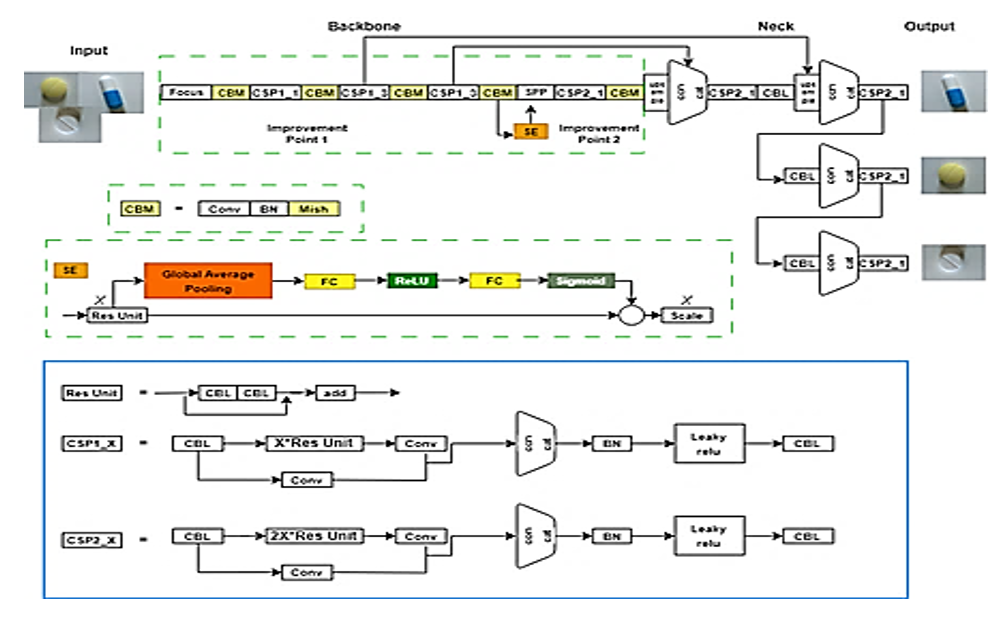Automated Medicine Dispenser and Verification by YOLOv5 Models
DOI:
https://doi.org/10.14456/jcct.2024.6Keywords:
Automated Medicine, Dispenser and Verification, YOLOv5 ModelsAbstract
Medication errors are a major problem to affects the safety of patients around the world, and is one of the causes of death is incorrect drug use. This issue is particularly acute for patients with complex medication schedules, exacter Medication errors are a major problem to affects the safety of patients around the world, and is one of the causes of death is incorrect drug use bated by hospital dispensing delays that contribute to these errors. This research focuses on developing an automated pill dispenser powered by a Raspberry Pi to enhance the accuracy of drug dispensing, reduce errors, and provide pertinent medication information. The system is designed to accept direct prescription inputs from physicians and incorporates YOLOv5 as the artificial intelligence (AI) component to ensure prescription accuracy. The findings from the development phase reveal that Model 3 demonstrated the highest efficiency at 64%. The AI's verification accuracy was determined to be 90%. Which makes the medication error from the system 11%.
Downloads
References
ABB. (2020, April 20). What is Deep Learning?. https://new.abb.com/news/detail/58004/deep-learning. (In Thai)
Al-Fuqaha, A., Guizani, M., Mohammadi, M., Aledhari, M., & Ayyash, M. (2015). Internet of Things: A Survey on Enabling Technologies, Protocols, and Applications. IEEE Communications Surveys & Tutorials, 17(4), 2347–2376. https://doi.org/10.1109/COMST.2015.2444095.
Almotiri, S. H., Khan, M. A., & Alghamdi, M. A. (2016). Mobile Health (m-Health) System in the Context of IoT. 2016 IEEE 4th International Conference on Future Internet of Things and Cloud Workshops (FiCloudW), 39–42. https://doi.org/10.1109/W-FiCloud.2016.24.
Amazon Web Services. (n.d.). What is API (Application Programming Interfaces)?. https://aws.amazon.com/th/what-is/api. (In Thai)
Anderson, B., & Nicholson, B. (2022, June 12). SQL vs. NoSQL Databases: What’s the Difference? IBM Blog. https://www.ibm.com/blog/sql-vs-nosql.
Anupama, A. H., Srilekha, G., & Uma Priya, G. (2020). Review on Artificial Intelligence (AI) in Drug Dispensing and Drug Accountability. International Journal of Pharmaceutical Sciences Review and Research, 61(2), 32-35. https://globalresearchonline.net/journalcontents/v61-2/07.pdf.
Barker, K. N., Pearson, R. E., Hepler, C. D., Smith, W. E., & Pappas, C. A. (1984). Effect of an Automated Bedside Dispensing Machine on Medication Errors. American Journal of Health-System Pharmacy, 41(7), 1352–1358. https://doi.org/10.1093/ajhp/41.7.1352.
Bu, F., Sun, H., Li, L., Tang, F., Zhang, X., Yan, J., Ye, Z., & Huang, T. (2022). Artificial Intelligence-based Internet Hospital Pharmacy Services in China: Perspective Based on a Case Study. Frontiers in Pharmacology, 13, 1027808. https://doi.org/10.3389/fphar.2022.1027808.
Chen, Z., Wu, R., Lin, Y., Li, C., Chen, S., Yuan, Z., Chen, S., & Zou, X. (2022). Plant Disease Recognition Model Based on Improved YOLOv5. Agronomy, 12(2), 365. https://doi.org/10.3390/agronomy12020365.
Dayananda, P., & Upadhya, A. G. (2024). Development of Smart Pill Expert System Based on IoT. Journal of The Institution of Engineers (India): Series B, 105(3), 457–467. https://doi.org/10.1007/s40031-023-00956-2.
de Bienassis, K., Esmail, L., Lopert, R., & Klazinga, N. (2022). The Economics of Medication Safety: Improving Medication Safety through Collective, Real-time Learning. OECD Publishing. https://doi.org/10.1787/9a933261-en.
Gargioni, L., Fogli, D., & Baroni, P. (2024). A Systematic Review on Pill and Medication Dispensers from a Human-Centered Perspective. Journal of Healthcare Informatics Research, 8(2), 244–285. https://doi.org/10.1007/s41666-024-00161-w.
Kim, J., Kwon, H., Kim, J., Park, J., Choi, S.-U., & Kim, S. (2022). PillGood: Automated and Interactive Pill Dispenser Using Facial Recognition for Safe and Personalized Medication. Proceedings of the Thirty-First International Joint Conference on Artificial Intelligence, 5920–5923. https://doi.org/10.24963/ijcai.2022/854.
Mumford, V., Raban, M. Z., Li, L., Fitzpatrick, E., Woods, A., Merchant, A., Badgery‐Parker, T., Gates, P., Baysari, M., Day, R. O., Ambler, G., Dalla‐Pozza, L., Gazarian, M., Gardo, A., Barclay, P., White, L., & Westbrook, J. I. (2024). Developing a Process to Measure Actual Harm from Medication Errors in Paediatric Inpatients: From Design to Implementation. British Journal of Clinical Pharmacology, 90(7), 1615–1626. https://doi.org/10.1111/bcp.16052.
Nasir, Z., Asif, A., Nawaz, M., & Ali, M. (2023). Design of a Smart Medical Box for Automatic Pill Dispensing and Health Monitoring †. INTERACT 2023, 7. https://doi.org/10.3390/engproc2023032007.
Niu, Y., Wang, L., Yu, Z., Huang, J., Huang, B., & Su, Y. (2023). Vision-based Automatic order Check Method for Online Medicine Dispensing Cabinet under Incomplete Data. Engineering Applications of Artificial Intelligence, 123, 106204. https://doi.org/10.1016/j.engappai.2023.106204.
Ravi, D., Wong, C., Deligianni, F., Berthelot, M., Andreu-Perez, J., Lo, B., & Yang, G.-Z. (2017). Deep Learning for Health Informatics. IEEE Journal of Biomedical and Health Informatics, 21(1), 4-21. https://doi.org/10.1109/JBHI.2016.2636665.
Shen, D., Wu, G., & Suk, H.-I. (2017). Deep Learning in Medical Image Analysis. Annual Review of Biomedical Engineering, 19(1), 221–248. https://doi.org/10.1146/annurev-bioeng-071516-044442.
Watson, D. (2018, July 24). Introduction to Raspberry Pi 3 B+. The Engineering Projects. https://www.theengineeringprojects.com/2018/07/introduction-to-raspberry-pi-3-b-plus.html.
Xu, X., Zhang, X., & Zhang, T. (2022). Lite-YOLOv5: A Lightweight Deep Learning Detector for On-Board Ship Detection in Large-Scene Sentinel-1 SAR Images. Remote Sensing, 14(4), 1018. https://doi.org/10.3390/rs14041018.
Zanella, A., Bui, N., Castellani, A., Vangelista, L., & Zorzi, M. (2014). Internet of Things for Smart Cities. IEEE Internet of Things Journal, 1(1), 22–32. https://doi.org/10.1109/JIOT.2014.2306328.
Zheng, Y., Rowell, B., Chen, Q., Kim, J. Y., Kontar, R. A., Yang, X. J., & Lester, C. A. (2023). Designing Human-Centered AI to Prevent Medication Dispensing Errors: Focus Group Study With Pharmacists. JMIR Formative Research, 7, e51921. https://doi.org/10.2196/51921.

Downloads
Published
How to Cite
Issue
Section
Categories
License
Copyright (c) 2024 Journal of Computer and Creative Technology

This work is licensed under a Creative Commons Attribution-NonCommercial-NoDerivatives 4.0 International License.






























